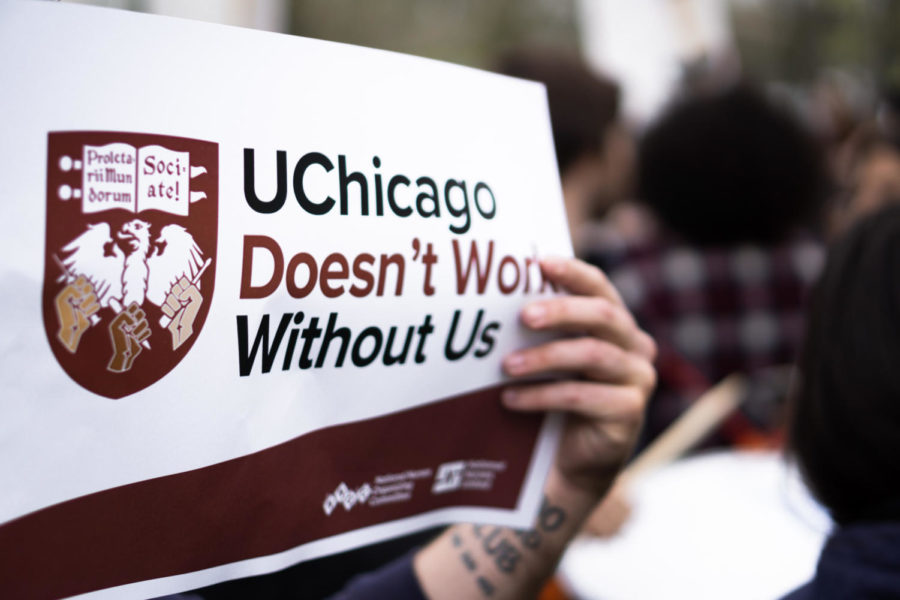The University of Chicago Labor Council hosted a May Day March on Wednesday in conjunction with Graduate Students United (GSU) to advocate for workers’ rights at UChicago and in the broader South Side community. The march, and subsequent rally on the University’s main quad, drew more than 200 demonstrators from South Side labor organizations.
The University of Chicago Labor Council is a newly formed umbrella organization that describes itself as “a council of stewards from all unions working for the University of Chicago, working together to build worker’s power and solidarity.” It encompasses workers’ groups at the University including GSU; National Nurses United; Service Employees International Union, Local 1; International Brotherhood of Teamsters, Local 743; International Brotherhood of Electrical Workers, Local 134; Bakery Confectionery Tobacco Workers and Grain Millers Union; Flood's Hall; Tenants United; Chicago Jobs with Justice; and Greater Chicago Industrial Workers of the World.
Demonstrators started marching at 59th Street and Ellis Avenue before rallying on the main quad. On the way, they unfurled a large “Patients Over Profits” banner at a parking structure at the UChicago Medical Center.
GSU has been organizing on behalf of UChicago graduate student workers for more than a decade, in the face of administrators’ continued opposition to unionization. In 2017, graduate students voted by a two-to-one ratio to form a union. Organizers have been engaging in direct action since the vote, including a walk out last October. On Monday, Student Government passed a resolution formally encouraging University administrators to negotiate with GSU.
Jordie Davies, a Ph.D. candidate in the Department of Political Science and a member of GSU, enumerated GSU’s demands. “We demand that the administration recognize our union and agree to bargain with the graduate workers. It is egregious for a university to claim to value free speech and to refuse to recognize our democratically elected union. We deserve a voice; we deserve to be heard,” Davis said in a speech at the march.
Several other labor activists also spoke in support of GSU. Ben Laurence, a lecturer in the philosophy department, said the unionization efforts of graduate students are similar to those of non–tenure track faculty represented by Faculty Forward, which ratified a contract with the University last year, following years of negotiations.
“Four years ago, we started organizing a union. The administration opposed the efforts, arguing that it would be counterproductive. But we did it anyway. For too long being a lecturer at the University of Chicago had meant being in the shadows. It had meant a lack of stable employment, subjection to administrative whims, substandard wages and benefits, and it meant having no voice,” Laurence told demonstrators.
Don Villar, secretary-treasurer of the Chicago Federation of Labor, offered the support of a broad coalition of Chicago labor organizations to GSU. “We stand in solidarity with you all. You’re not alone. Half a million working men and women—union members—across Chicago and Cook County stand in solidarity with you today,” Villar said.
GSU organizers gave the microphone to several activists not originally slated to speak at the event, who spoke in opposition to an immigration detention center being built in Dwight, Illinois. The activists asked the assembled labor organizers if they stood in solidarity with people affected by adjacent issues. “Who are you here for? Are you here just for workers? These people work also; our communities also work,” one of the activists said.
Near the end of the rally, two men not apparently associated with the Labor Council arrived carrying an American flag and pushed their way to the front of the crowd, at which point a demonstrator grabbed the flag and threw it on the ground. It was not clear whether the individual was associated with GSU, or with other demonstrators present at the event, who were dressed in black and carrying materials emblazoned with antifa (anti-fascist) iconography. The confrontation did not escalate further.









